
Victoria is the capital city of the Canadian province of British Columbia, on the southern tip of Vancouver Island off Canada's Pacific coast. The city has a population of 91,867, and the Greater Victoria area has a population of 397,237. The city of Victoria is the seventh most densely populated city in Canada with 4,406 inhabitants per square kilometre (11,410/sq mi).
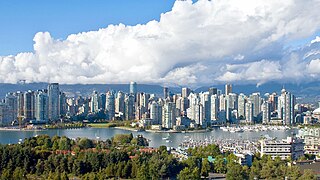
Vancouver is a major city in western Canada, located in the Lower Mainland region of British Columbia. As the most populous city in the province, the 2021 Canadian census recorded 662,248 people in the city, up from 631,486 in 2016. The Metro Vancouver area had a population of 2.6 million in 2021, making it the third-largest metropolitan area in Canada. Greater Vancouver, along with the Fraser Valley, comprises the Lower Mainland with a regional population of over 3 million. Vancouver has the highest population density in Canada, with over 5,700 inhabitants per square kilometre (15,000/sq mi), and the fourth highest in North America.

Vancouver International Airport is an international airport located on Sea Island in Richmond, British Columbia, serving the city of Vancouver and the Lower Mainland region. It is located 12 km (7.5 mi) from Downtown Vancouver. YVR is the second busiest airport in Canada by passenger traffic, behind Toronto Pearson International Airport in Ontario. As a trans-Pacific hub, the airport has more direct flights to China than any other airport in North America or Europe. It is a hub for Air Canada and WestJet. Vancouver International Airport is one of eight Canadian airports that have US Border Pre-clearance facilities. It is also one of the few major international airports to have a terminal for scheduled float planes.

The Regional Municipality of Durham, informally referred to as Durham Region, is a regional municipality in Southern Ontario, Canada. Located east of Toronto and the Regional Municipality of York, Durham forms the east-end of the Greater Toronto Area and part of the Golden Horseshoe region. It has an area of approximately 2,500 km2 (970 sq mi). The regional government is headquartered in Whitby.
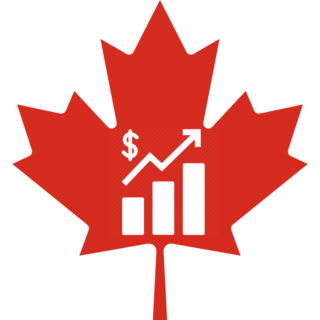
Canada has a large domestic and foreign tourism industry. The second largest country in the world, Canada's wide geographical variety is a significant tourist attractor. Much of the country's tourism is centred in the following regions: Toronto, Montreal, Quebec City, Vancouver/Whistler, Niagara Falls, Vancouver Island, Canadian Rockies, British Columbia's Okanagan Valley, Churchill, Manitoba and the National Capital Region of Ottawa-Gatineau. The large cities are known for their culture, diversity, as well as the many national parks and historic sites.

Nanaimo is a city of about 100,000 on the east coast of Vancouver Island, in British Columbia, Canada. "The Harbour City" was previously known as the "Hub City", which was attributed to its original layout design with streets radiating from the shoreline like the spokes of a wagon wheel, and to its relatively central location on Vancouver Island. Nanaimo is the headquarters of the Regional District of Nanaimo.

Port Coquitlam is a city in British Columbia, Canada. It is one of 21 municipalities comprising Metro Vancouver. Located 27 km (17 mi) east of Vancouver, it is on the north bank of the confluence of the Fraser River and the Pitt River. Coquitlam borders it to the north and west. Pitt Meadows lies across the Pitt River from it. Port Coquitlam is bisected by Lougheed Highway and the Canadian Pacific Kansas City railway. Port Coquitlam is often referred to as "PoCo". It is Canada's 93rd-largest municipality by population.
Hollywood North is a colloquialism used to describe film production industries and/or film locations north of its namesake, Hollywood, California. The term has been applied principally to the film industry in Canada, specifically to the cities Toronto and Vancouver.
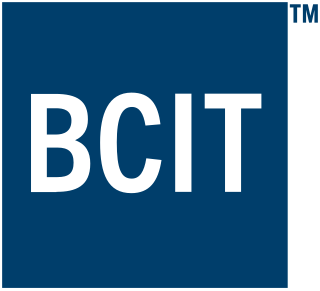
The British Columbia Institute of Technology, is a public polytechnic institute in Burnaby, British Columbia, Canada. The technical institute has five campuses located in the Metro Vancouver region, with its main campus in Burnaby, British Columbia, Canada. There is also the Aerospace Technology Campus in Richmond, the Marine Campus in the City of North Vancouver, Downtown campus in Vancouver, and Annacis Island Campus in Delta. It is provincially chartered through legislation in the College and Institute Act. The school operates as a vocational and technical school, offering apprenticeships for the skilled trades and diplomas and degrees in vocational education for skilled technicians and workers in professions such as engineering, accountancy, business administration, broadcast/media communications, digital arts, nursing, computing, medicine, architecture, and law.
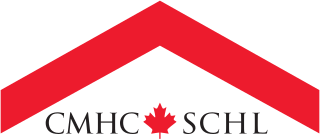
Canada Mortgage and Housing Corporation is Canada's federal crown corporation responsible for administering the National Housing Act, with the mandate to improve housing by living conditions in the country.
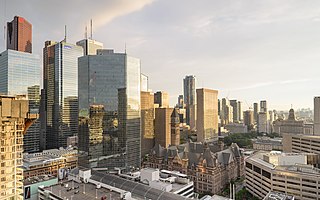
The economy of Toronto is the largest contributor to the Canadian economy, at 20% of the national GDP, and an important economic hub of the world. Toronto is a commercial, distribution, financial and industrial centre. It is Canada's banking and stock exchange centre and is the country's primary wholesale and distribution point. Ontario's wealth of raw materials and hydroelectric power have made Toronto a primary centre of industry. The metropolitan area of Greater Toronto produces more than half of Canada's manufactured goods. The economy of Toronto has had a GDP growth rate of 2.4 percent annually since 2009, outpacing the national average. Toronto's population was 3.025 million people as of 2022, while the population of the Toronto census metropolitan area was 6.47 million during the same year.

The economy of New York City encompasses the largest municipal and regional economy in the United States. In 2022, the New York metropolitan area generated a gross metropolitan product (GMP) of US$1.4trillion, with a population of 23.6 million people. Anchored by Wall Street in Lower Manhattan, New York City has been characterized as the world's premier financial center. The city is home to the New York Stock Exchange and Nasdaq, the world's two largest stock exchanges by both market capitalization and trading activity.

Sea Island Centre is an at-grade station on the Canada Line of Metro Vancouver's SkyTrain rapid transit system. The station is located on Sea Island in Richmond, British Columbia.

Hamilton, Ontario is a port city in Canada.

Canada's cities span the continent of North America from east to west, with many major cities located relatively close to the border with the United States. Cities are home to the majority of Canada's approximately 35.75 million inhabitants —just over 80 percent of Canadians lived in urban areas in 2006.

Montreal's economy is the second largest of all cities in Canada and the first in Quebec. Montreal is a centre of commerce, industry, technology, culture, finance, and world affairs. In 2022, Metropolitan Montreal was responsible for $233 Billion CDN of Quebec's $425 Billion CDN GDP, with a population of 4.37 million people. Montreal's economy, therefore, comprises approximately 54.8% of Quebec's overall GDP.
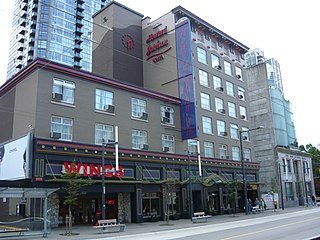
Affordable housing in Canada refers to living spaces that are deemed financially accessible to households with a median household income. Housing affordability is generally measured based on a shelter-cost-to-income ratio (STIR) of 30% by the Canada Mortgage and Housing Corporation (CMHC), the national housing agency of Canada. It encompasses a continuum ranging from market-based options like affordable rental housing and affordable home ownership, to non-market alternatives such as government-subsidized housing. Canada ranks among the lowest of the most developed countries for housing affordability.

The economy of San Diego is the 17th largest among metro areas in the United States and 4th largest among California's metro areas, with a gross domestic product in Greater San Diego of $206 billion in 2014. The economy is also part of the San Diego–Tijuana international metropolitan conurbation. The largest sectors of San Diego's economy are defense/military, tourism, international trade, and research/manufacturing, respectively. In 2014, San Diego was designated by a Forbes columnist as the best city in the country to launch a small business or startup company.

The Canadian property bubble refers to a significant rise in Canadian real estate prices from 2002 to present. The Dallas Federal Reserve rated Canadian real estate as "exuberant" beginning in 2003. From 2003 to 2018, Canada saw an increase in home and property prices of up to 337% in some cities. In 2016, the OECD warned that Canada's financial stability was at risk due to elevated housing prices, investment and household debt. By 2018, home-owning costs were above 1990 levels when Canada saw its last housing bubble burst. Bloomberg Economics ranked Canada as the second largest housing bubble across the OECD in 2019 and 2021. Toronto scored the highest in the world in Swiss bank UBS' real estate bubble index in 2022, with Vancouver also scoring among the 10 riskiest cities in the world.

British Columbia (B.C.) is the third largest Canadian province by population and fourth largest provincial economy. Like other provinces in the Canadian federation, B.C. consists of both private and public institutions. However, as Canada's westernmost province, located between the Pacific Ocean and the Rocky Mountains, B.C. has unique economic characteristics that distinguish it from much of the rest of Canada.






















